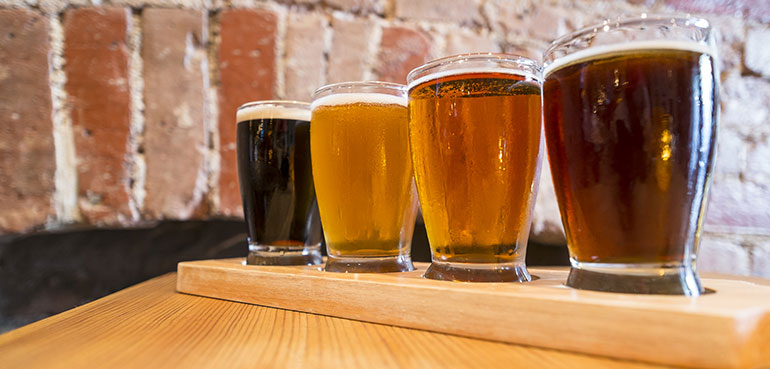By Nancy Snyder, MS, RD
As craft beer has grown in popularity, this question is asked more and more frequently. Even researchers have begun taking a closer look at this ancient brew. While we only seem to hear about the health benefits of wine, beer can also deliver some nutritional perks while serving as a healthier alternative to soda and other sugary beverages.
Not only is beer fat-free; it is comparable in calories to soda but with significantly fewer carbohydrates and sugars. For example, a 12-ounce serving of beer contains roughly 150 calories and 13 grams of complex carbohydrates, and a 12-ounce can of coke contains 140 calories but with 39 grams of carbohydrates—all of which come from sugar. When dining out, continuous refills of soda by your server can make it difficult to track consumption, whereas enjoying just one beer with dinner can help you to stay on track.
Since beer is brewed from hops, barley and wheat, it also delivers many of the same nutrients that grains do, such as B vitamins and various minerals. And while wine may get all the credit for its antioxidant properties, beer contains just the same amount!
Moderate consumption of beer (which is defined as one drink per day for women and two drinks per day for men) has been shown to aid in the prevention of cardiovascular disease, reduced cognitive impairment, decreased risk of developing kidney stones, as well as improved bone health due to its silicon content.
With so many varieties of beer out there, which is best?
If you’re counting calories, light versions of your favorite beer will save you roughly 50 calories while also cutting the amount of carbs in half. Or you can shoot for a lager or wheat beer, which tend to be lower in calories and carbs than heavier beers such as stouts, ales, and porters.
However, if you’re just the occasional drinker and want more nutritional bang for your buck, opting for a dark beer can prove more beneficial; with lighter varieties, the nutritional value often gets cut right along with the calories, whereas heavier beers contain more vitamins, minerals and antioxidants.
Whether you’re tracking calories or enjoying the taste and nutritional benefits of a heavier brew, beer can be enjoyed as part of a healthy restaurant meal when consumed in moderation. Cheers to that!

